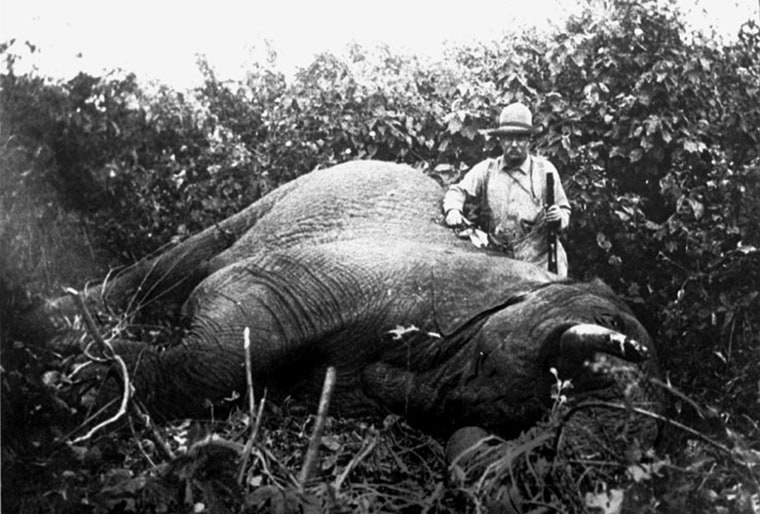Early U.S. presidents went home to their farms. Later ones scattered to the seashore.
Presidents have been bailing out of Washington's steamy summers ever since Thomas Jefferson gazed out the White House windows and watched a white fog roll in, widely believed to be toxic.
Presidents need vacations as much as the next guy, maybe more so.
Harry Truman played poker on the porch in Key West, Fla. Ronald Reagan rode horses at his mountain ranch in California. John Kennedy sailed the Atlantic.
Vacations give presidents a break from the pressures of Washington and — sometimes — a fresh way to connect with voters.
It was no coincidence that Bill Clinton and his family went hiking in Yellowstone National Park when he needed to shore up his appeal in the West. Or that Woodrow Wilson kicked back in Pass Christian on Mississippi's Gulf Coast when he needed southern Democrats.
Vacations at the Vineyard
There doesn't appear to be any big political strategy behind Barack Obama's decision to head for Martha's Vineyard in Massachusetts, an island playground for the rich frequented in years past by presidents Clinton and Ulysses S. Grant. Obama, whose vacation on the island begins Sunday, has visited twice before. More typically he has vacationed in Hawaii, where he was born and spent time as a child.
For president-watchers, his choice of a Vineyard vacation marks a change from the eight-year Texodus. George W. Bush spent 490 days of his presidency at his secluded ranch in Crawford, Texas.
While Bush's trips to the ranch may not have been politically calculated, they helped shape his image as a boots-wearing everyman rather than an Ivy League graduate with a New England pedigree.
"Most Americans don't sit in Martha's Vineyard, swilling white wine," Bush once said, when asked why he vacationed in one of the hottest spots in the nation in the hottest month of the year.
The Clintons couldn't get enough of the vineyard. They were island regulars through the highs and lows of Clinton's presidency.
On their first presidential vacation there in 1993, they were photographed happily sailing, golfing and exploring the island's restaurants and scenery together.
Five years later, it was a different story. The Clintons headed for the island just hours after the president publicly confessed to an inappropriate relationship with intern Monica Lewinsky. This time, photographers snapped pictures of Chelsea Clinton walking to the helicopter hand-in-hand with her two parents, serving as a buffer of sorts between an unhappy husband and wife.
When the family reached the vineyard, Hillary slept in the bedroom; Bill on the couch.
"Buddy, the dog, came along to keep Bill company," Mrs. Clinton wrote in her memoir. "He was the only member of our family who was still willing to."
‘Job seems to follow you’
Vacations may offer a respite from Washington's heat, but they can't erase the burdens of a president's job.
As Bush observed early in his tenure: "The funny thing about his job, is that the job seems to follow you around." That was as he left the golf course in Maine for an intelligence briefing and staff meeting.
White House historian William Seale said presidential getaways invariably turn into working vacations.
"You get the ocean and the breeze, but you've still got the work," Seale said. "You're not going to be un-president for a while, as appealing as that might be."

Teddy Roosevelt ambitiously mixed work and play, becoming the first president to vacation with an extensive White House staff and communications. It was at his annual summer getaway, at Oyster Bay on Long Island, New York, that he secured a peace deal between Japan and Russia that won him the 1906 Nobel Peace Prize.
An ardent sailor who gave up the presidential yacht in World War II, Franklin D. Roosevelt retreated to Shangri-La, now Camp David, in Maryland to work on his stamp collection — and plans for the Normandy invasion with his guest, British Prime Minister Winston Churchill.
For some presidents, even a trip across town has provided a welcome break: For three summers, Abraham Lincoln and his family retreated to a cottage at a military complex on the outskirts of Washington.
Anderson Cottage at the Soldiers' Home is where Lincoln spent a full quarter of his presidency, sometimes meeting with visitors there in his slippers. It is believed he wrote the Emancipation Proclamation freeing the slaves there, and it is where he got word of the triumph at the decisive battle of Gettysburg.
Lincoln commuted the three miles (five kilometers) to the White House daily, visiting the cottage for the last time on April 13, 1865, the day before his assassination.
Seale said the earliest presidents were mostly farmers, and would head home during the summers to check on their crops.
Jefferson's frequent trips to his Monticello plantation in Virginia made it perhaps the most famous "second White House."
Victorian era presidents favored the Jersey shore — James A. Garfield died there in 1881, two months after being shot at the Washington train station as he prepared to depart for a seaside resort.
Early on, Seale said, leaving Washington in the summer was considered a necessity for health reasons. The fog that formed on the marshes near the White House was called the "White Lot," and believed to be lethal.
"Washington pretty much closed down in June until mid or late September," Seale said.
James K. Polk was a rare exception who decided to stick it out through Washington's summers, according to Seale.
He died just months after retiring, his death widely blamed on the "white gases."